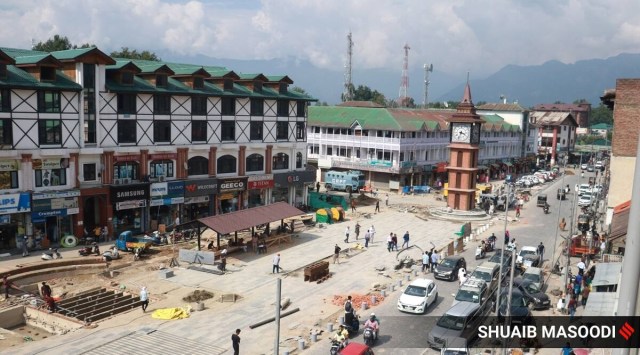“All arguments on fraud on the Constitution are completely misconceived…no deviation from due process,” Attorney General R Venkataramani told a five-judge Constitution bench presided by Chief Justice of India D Y Chandrachud.”

“I looked into all Presidential proclamations…120 of them, particularly in the context of Jammu and Kashmir. The suspension of provisions of Article 3, the two provisos and various other provisions are in terms of a convention the Presidential proclamation follows. No deviation has taken place as far as this particular Presidential proclamation is concerned,” the A-G told the bench, also comprising Justices S K Kaul, Sanjeev Khanna, B R Gavai and Surya Kant.
Story continues below this ad
The A-G told the court that the running theme of his arguments would be on balancing between losing the nation and preserving the Constitution — that “equally, one cannot postulate a situation where the ends justify the means” and “means should also be consistent with the end”.
Appearing for the Centre and the J&K administration, Solicitor General Tushar Mehta told the court that J&K had fully surrendered its sovereignty to the Union of India upon accession, and that the petitioners “are confusing internal sovereignty with autonomy”.
He said: “(As for) external sovereignty, nobody can dispute that it is with the Union of India… Internal sovereignty in the facts of our case, and in the Constitutional structure which we have accepted, would mean autonomy of the federating units and which autonomy is there with every state.”
“It’s actually there with every institution — like we are the autonomous authority to decide a Constitutional issue,” the CJI remarked. “But we can’t say internal sovereignty vests with us. We are an independent autonomous institution under the Constitution.”
Story continues below this ad
Mehta cited from the Proclamation issued by Karan Singh [son of Kashmir’s then ruler Hari Singh] on November 25, 1949, to buttress his argument that the sovereignty was completely given up to the Union of India.
He pointed out that the proclamation said that the Government of Indian Act, 1935, which until then governed the Constitutional relationship between J&K and the Dominion of India, will stand repealed. It stated that the “Constitution of India shortly to be adopted by the Constituent Assembly of India shall, in so far as it is applicable to the State of Jammu and Kashmir, govern the Constitutional relationship between this State and the contemplated Union of India and shall be enforced in this State by me, my heirs and successors in accordance with the tenor of its provisions” and “the provisions of the said Constitution shall, as from the date of its commencement, supersede and abrogate all other constitutional provisions inconsistent therewith which are at present in force in this State.”
Mehta told the court, “This is beyond any Instrument of Accession (IoA) or merger. This is accepting supremacy of our Constitution and surrendering sovereignty to the Constitution, where the sovereign is ‘We the people of India’.”
The hearing resumes on August 2.
The CJI pointed out that this proclamation was “on the same day as B R Ambedkar’s last address to the Constituent Assembly…. By this point of time the entirety of the Constitution had been formulated, including 370. Therefore, when he makes this proclamation, he makes it in the light of 370, which is also before him. There can’t be any doubt about that.”
Story continues below this ad
Mehta said, “The Constituent Assembly formed for J&K subsequently was not a plenary Constituent Assembly like the way we had our Constituent Assembly because by that time the sovereignty had already merged. There cannot be two Constitutions. Therefore, the sanctity of that document that we call the Constitution is nothing more than an act of legislation.”
He said this furthers the point that the words ‘Constituent Assembly’ in Article 370(3) can be read only as ‘Legislative Assembly’…”
Justice Khanna however said this would need more clarification.
The CJI too said that “eventually when you argue that this is not a Constituent Assembly but a Legislative Assembly in its original form, you will have to answer how this squares up to clause (2) of Article 370, which specifically says Constituent Assembly formed for purpose of framing Constitution of J&K, because there is a textual answer which may militate against your line of approach”.
The bench said it expects Mehta to address these queries as he goes ahead with his arguments.
Story continues below this ad
Agreeing, Mehta said he will also show “how Article 370 worked till 2018” and that “some of the things are really shocking”.








